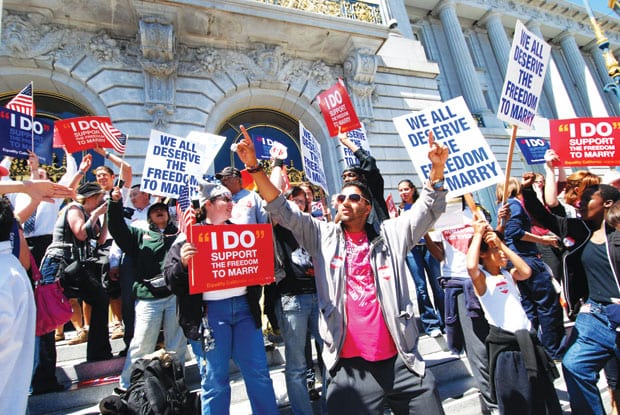UCLA’s Williams Institute provides estimate as U.S. Supreme Court prepares to decide whether to hear cases challenging Prop 8, DOMA

UPON FURTHER REVIEW … | Marriage equality supporters celebrated a victory in California’s Prop 8 case outside San Francisco City Hall in 2010, but the victory wasn’t final, and the U.S. Supreme Court is expected to announce whether it will take up the case on Monday, Dec. 3. (Associated Press)
As the U.S. Supreme Court decides whether to weigh in on marriage equality, new estimates show Texas’ ban on same-sex marriage will cost the state $182.5 million over the next three years.
The Williams Institute, a prominent LGBT think tank at UCLA, estimates that same-sex couples marrying in Maine, Washington and Maryland — where voters recently approved marriage equality — will gross a combined $166.6 million for the states in three years.
The estimate is based on Census 2010 data if 50 percent of same-sex couples marry in the first three years, which is consistent with what has happened in other states with marriage equality. The estimate takes into account the average wedding expenditures in the state and tourism reports.
The institute then calculated what Texas’ economy could gain from marriage equality, and it projected that $182.5 million was likely to result from same-sex weddings in the first three years. While the amount is more than the other three states combined, LGBT experts say it could take Texas more than a decade to legalize or be forced to recognize same-sex marriage.
The estimates don’t take into account the gay couples who are already married or registered as domestic partners in a state, nor do they factor in revenue generated from out-of-state couples who would plan weddings in the state. The institute found that 1,200 out-of-state couples traveled to Iowa in the first year of its marriage equality, which brought in revenue from wedding and tourism services.
Christy Mallory, Reid Rasmussen Fellow at the Williams Institute, said the estimates are particularly meaningful because any revenue is important during budget crises.
California’s economy could soon see a boost in wedding revenue if the U.S. Supreme Court opts not to hear a lawsuit challenging Proposition 8 — the state’s constitutional amendment banning same-sex marriage.
Mallory said the Williams Institute has not yet run a similar estimate for California. But in 2008 the institute calculated that taxes on same-sex weddings alone would bring in $63.8 million over three years in California.
Brian Moulton, legal director at the Human Rights Campaign, said it’s expected that the Supreme Court won’t hear the Prop 8 case — instead letting the U.S. 9th Circuit Court of Appeals ruling stand, which would mean same-sex marriage could be legal in California a few days later. The court could also hold the Prop 8 case if it takes one of several cases challenging the Defense of Marriage Act, then send the Prop 8 case back to the appeals court in light of their opinion on DOMA.
Moulton said if the Prop 8 case is heard, it’s likely it would be to overturn the decision. However, it’s possible the court could affirm the decision in a broad decision that could affect states around the country.
The high court is expected to decide on the Prop 8 case and the DOMA cases at its conference Friday, Nov. 30, and will likely announce its decisions Monday, Dec. 3.
As for DOMA, Moulton said the court is expected to take at least one of the cases with the hope that it will uphold previous rulings and find the anti-gay law unconstitutional.
“Obviously if the court takes it up, we hope that means that they will eventually uphold all of the lower courts that have struck DOMA down and give us a final answer on that question,” he said. “The most problematic outcome would be if they decide not to take any of the DOMA cases and we’re left not having a final answer on the constitutionality of that law.”
The Supreme Court has faced criticism in the past for moving too fast on abortion and too slow on interracial marriage, but Moulton said the court is aware of the recent marriage equality wins and a popular opinion that favors marriage equality.
“Certainly they’re not ignorant of the practicalities of these questions that are coming sooner or later before the court and could deal with them now or put that off until another day,” he said.
The Supreme Court will also decide whether to hear Diaz v. Brewer, an Arizona case in which state employees sued after their domestic partner benefits were revoked under the state’s marriage amendment.
Diaz is currently before the 9th Circuit Court of Appeals, which issued a temporary injunction to allow the DP benefits to continue until the case was decided.
The court asked the Supreme Court to review the case.
Ken Upton, a senior staff attorney in Lambda Legal’s Dallas office, said he wouldn’t be surprised if the court declines to hear the DP benefits case because the it rarely takes cases that haven’t been decided.
He said it’s possible the court could set it aside and give guidance on how the 9th Circuit could interpret the law.
If the court does take the case, Upton said it could help Texas if the court writes a decision that requires states to offer benefits to domestic partners, especially in light of Sen. Dan Patrick, R-Houston, who has requested the Texas attorney general’s opinion on whether Texas governmental entities can offer them without violating the state’s constitutional amendment banning same-sex marriage.
This article appeared in the Dallas Voice print edition November 30, 2012.

